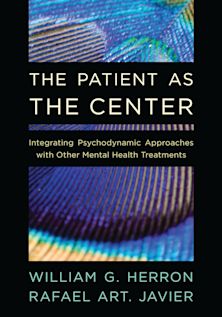Bloomsbury Home
- Home
- ACADEMIC
- Psychology
- Psychotherapy & Counselling
- Hypocrisy Unmasked
For information on how we process your data, read our Privacy Policy
Thank you. We will email you when this book is available to order
You must sign in to add this item to your wishlist. Please sign in or create an account
Description
Hypocrisy Unmasked explores the motives, meanings, and mechanisms of hypocrisy, challenging two principal psychoanalytic assumptions: First, that hypocrisy expresses deviant, uncontrollable impulses or follows exclusively from superego weakness; and second, that it can be understood solely in terms of intrapsychic factors without reference to the influences of the field. Ronald C. Naso argues that each of these assumptions devolve into criticisms rather than explanations and demonstrates that hypocrisy represents a compromise among intrapsychic, interpersonal, situational, and cultural/linguistic forces in an individual life. Hypocrisy Unmasked accords a healthy respect to the hypocrite's existentiality, including variables like opportunity and chance, and focuses on situations where the hypocrite's desires differ from those of others and on the moral principles that count in decision-making rather than how they are subsequently rationalized. Ultimately, hypocrisy exposes the ineradicable moral ambiguity of the human condition and the irreconcilability of desires and obligations.
Table of Contents
Part 2 Introduction
Part 3 Part I: Topographies of Transgression
Chapter 4 Chapter 1: The Paradox of Hypocrisy
Chapter 5 Chapter 2: The Call of Conscience
Chapter 6 Chapter 3: Perversion and Moral Reckoning
Part 7 Part II: The Ethics of Inauthenticity
Chapter 8 Chapter 4: Compromises of Integrity
Chapter 9 Chapter 5: Beneath the Mask
Chapter 10 Chapter 6: Youthful Indiscretions
Part 11 Part III: From Hypocrisy to Moral Ambiguity
Chapter 12 Chapter 7: Dissociation as Self-Deception
Chapter 13 Chapter 8: Multiplicity and Moral Ambiguity
Chapter 14 Conclusion
Part 15 Bibliography
Product details
| Published | Mar 18 2010 |
|---|---|
| Format | Ebook (PDF) |
| Edition | 1st |
| Extent | 236 |
| ISBN | 9798216310587 |
| Imprint | Jason Aronson, Inc. |
| Series | New Imago |
| Publisher | Bloomsbury Publishing |
About the contributors
Reviews
-
Through striking clinical examples and painstaking analysis, Naso documents hypocrisy's emergence as a form of compromise against the backdrop of ambiguity and moral dissonance that virtually defines postmodern sensibility. Masterfully exposing the vital pull of the field without negating individual agency, he nests hypocrisy in a search for attunement that goes far in explaining its ubiquity in human affairs and its enactment in the consulting room by client and therapist alike. Hypocrisy Unmasked illuminates the intersection of two-person psychology and contemporary ethics in ways that will enhance our capacity to negotiate moral uncertainty, both in our patients and ourselves.
Abby Stein PhD, John Jay College of Criminal Justice; author of Prologue to Violence: Child Abuse, Dissociation, and Crime
-
Dr. Ron Naso presents us with an intriguing and highly original exploration of the phenomenon of hypocrisy. A psychoanalytically oriented psychologist, Naso asks us to consider hypocrisy without 'collapsing' it into psychopathology. He draws on psychoanalytic and philosophical texts to explore the sources of hypocrisy in dissociative mechanisms which function to avoid shame at the expense of morality.
Ellen Nasper, PhD, Yale School of Medicine
-
Rather than succumb to the accepted yet simplistically negative definition of hypocrisy, Dr. Naso has unmasked the intricacies of purpose and context, then reformulated this designation in the best postmodern tradition. The result of his efforts is a stunning book demonstrating originality, creativity, nuance, and keen scholarship. This book makes a significant and welcome contribution to the discussion of shame and dissociation for both clinicians and academics.
Richard Raubolt, PhD, author of Power Games Influence, Persuasion, and Indoctrination in Psychotherapy Training

































